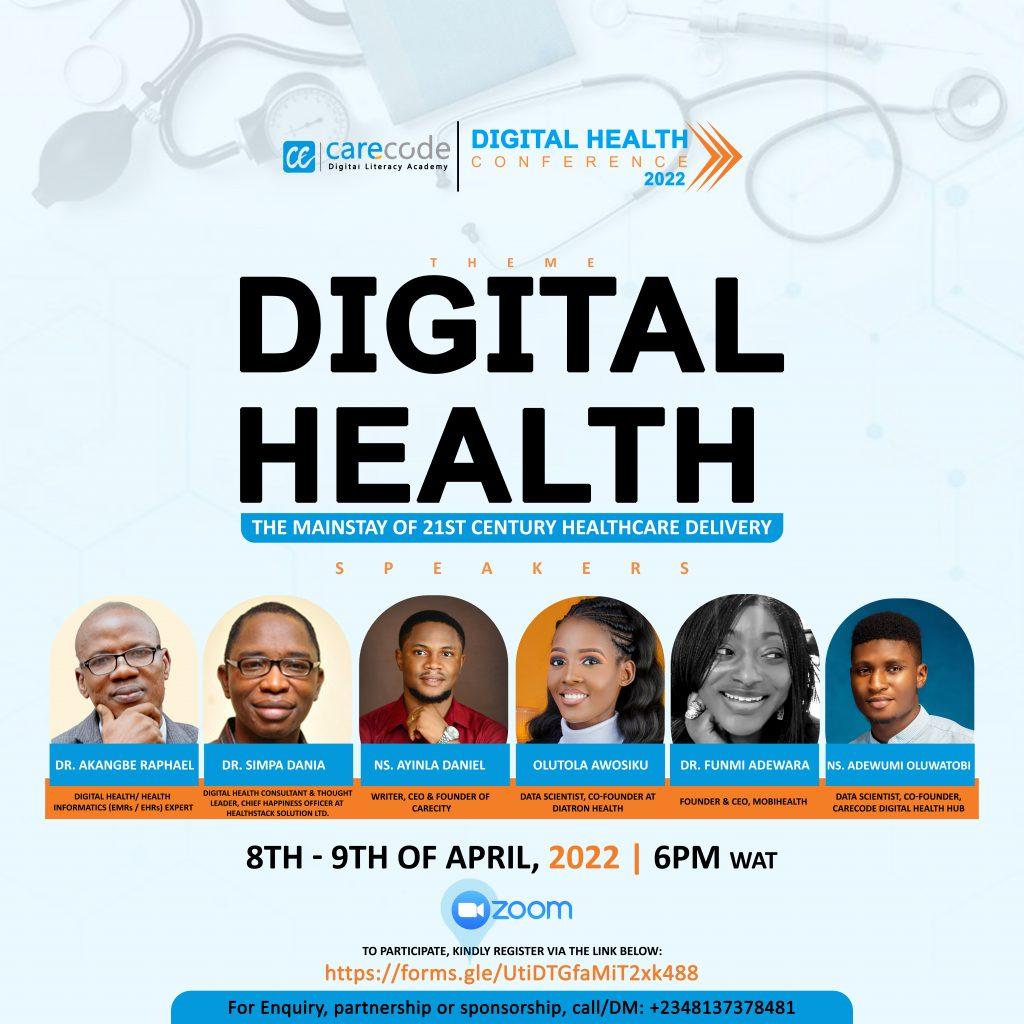You are a healthcare professional in Africa…
You love tech…
You want to be a player [and not just a spectator or user]…
You want to use the power of tech to transform your life and change the world, but…
You don’t have any background in computer science or engineering or any experience with the technicalities of the world of tech.
You don’t know a thing about codes.
You may not even know the differences between Java, Python, or C [or C++].
Well, you are not alone, and the tech world has adjusted, it has evolved to accommodate people who are not “core techies” to play major roles in the world of technology.
How?
Let me help you…

Is Technology All About Codes & Stuff?
No, tech goes beyond just writing codes and all the technicalities that come with computers, software, and algorithms.
The tech ecosystem is currently experiencing a phenomenal revolution. Let’s say the code culture is adapting.
In the early years, the world of core tech was preserved for the code writing geeks. If you knew nothing about codes and all that technical stuff, you did not have a place in the space of tech [go do something else].
But things have changed, drastically. We now have complex platforms that allow non-technical entrepreneurs to solve problems without being core techies themselves.
Now, you can build things in the tech space without having to learn how to code. It’s exciting.
It’s even more exciting for those of us in the African healthcare industry who are starting to realize the immense benefits of digital technologies.
We can now get our hands dirty and get directly involved with the process of creating digital healthcare solutions that are designed for the unique African landscape.
Healthtech entrepreneurs in Africa are already getting busy with innovating and creating. All thanks to the no-code movement.
The world of tech is growing at an exponential rate. Each day presents us with new and exciting developments.
Tines, a no-code startup for security analysts have been able to automate complex processes in the space of security analysis, almost completely eliminating the need to write complex codes before certain processes can work. It’s amazing. It shows us what the future of the no-code movement may look like.
“Anyone, no matter what their technology background, will be as effective as a senior software engineer after three hours,”
Those are the words of Hinchy, founder of Tines.
Imagine being able to work with the same efficiency as a senior software engineer who knows all the codes in the world, because of a brilliant no-code platform.
You can now create your applications and software without having to know how to write codes. You can build superb websites without being grounded in HTML.
All you may need is the idea and guidance from experts.
One of the advantages of the concept of no-code is that this development puts the people who understand the problem right in the middle of the whole action.
Especially in the area of digital health.
Digital Health In Africa & The No-code Tech Movement

Healthcare tech has for long been developed most times in isolation of the full involvement of healthcare professionals themselves because only a few of them understand the technicalities involved in designing digital health solutions.
However, it’s all changing.
More healthcare professionals in Africa are beginning to pick interest in the world of tech and they are thinking innovatively about how they can use tech to solve the numerous healthcare problems in Africa.
This revelation is empowering healthcare professionals all over the continent. As more of them are beginning to learn the skills required to function in this new capacity.
The no-code movement makes it a whole lot easier for healthcare professionals who are not [core techies] in Africa to play major roles in the development of healthcare solutions using tech in Africa’s healthcare industry.
If you had an idea of developing an application or software or an AI that monitors the blood pressure of aged patients remotely, you may not have to be a senior software engineer to kick the ball rolling. Your idea and basic skills in the area of software development using no-code platforms can be augmented by the expertise of professionals who have core traditional knowledge. You are no longer just a spectator but an active participant in the processes. Your unique experience and exposure in interacting with real-life patients and clients mixed with your technical skill become an invaluable asset in the overall achievement of that one single goal.
The Democracy of Tech Skills
The no-code movement can be said to bring a level of “democratization” of these technical skills that were once only mastered by a few.
In the tech ecosystem, it’s getting harder to find experienced software engineers [and other skilled and experienced tech professionals], and this shortage has made the no-code movement even more popular, paving the way for a new crop of creators and innovators.
Digital Health enthusiasts in Africa must seize this opportunity. Instead of wasting time and resources writing complex codes, platforms with already designed/configured templates [built on graphical user interfaces] are used to produce the same results as with writing complex codes and algorithms.
That said, this does not imply that the roles of professional software engineers [and IT professionals] are going to be relegated to the background. We will still need their input and insight, their expertise, and exposure to help design these no-code and low code platforms and initiatives.
What the no-code movement aims to do is to create a robust tech ecosystem, where the development of ideas is made easier.
Innovating Through Rough Terrains
The healthcare sector in Nigeria is in shambles. Things are falling apart. And the government seems to have no idea how to fix the rot or they are not even concerned.
Despite the economic harshness here in Nigeria and Africa, innovators and entrepreneurs are not backing down.
They are pushing through the storm and pulling their weights.
In 2020, I was among the judges/panelists for a health tech Bootcamp organized by Data Scientist Network [DSN] and AI Commons, where teams of young innovators converged in a competition with their various health tech solutions [mainly protoypes], ranging from AI and software that can help detect mental illness to software that can help analyze the nutritional value of food.
In that hackathon, you could see the brilliance in the way these young people design solutions to healthcare problems. And guess what? No-code platforms formed the majority of tools used to design these solutions [with just little touches of traditional coding skills].
I also observed that a handful of these innovators were not core healthcare professionals. Though there were a few Physicians and Nurses among them. That scarcity shows that more healthcare professionals in Africa need to step into the digital health ecosystem. And the no-code movement gives them the required technical abilities to function effectively in that space.
In Conclusion
There are already a lot of health-tech startups in Africa [and more are still springing up]. In fact, in Africa, Fintech and Healthtech startups receive the most funding from investors.
We are beginning to see e-commerce giants like Jumia and Konga [in the area of healthcare logistics and distributions] develop strong interests in the world of health tech. This is a strong indicator that the digital health revolution is gradually taking roots in the African healthcare industry.
This also reveals that the future of digital health in Africa is promising. And the more reason why we need more healthcare professionals in Africa playing major roles in the health tech industry; designing products, making recommendations, influencing policies, and educating/guiding patients/users.
Though we can’t deny the presence of obvious stumbling blocks, especially in the delicate aspects of regulations and policies that guide novel industry ideas like “digital health”.
Carecode Digita Health Hub is one of such startups in Africa that is working to prepare healthcare professionals in Africa to rule and lead in the digitalized future of healthcare, not just in Africa.
We have seen the potential hidden in Africa’s healthcare industry, and we strongly believe that this potential can be harnessed.
We will be holding our first Digital Health Conference in a few days, and we want you to be there. It’s free and you have got nothing in the world to lose. Instead, you will get the rare opportunity of learning in a healthtech community in Africa that is interested in the development of healthcare professionals in Africa.
Get more details below…

Our anticipated Digital Health Conference is finally here. In a few days, we will come together to learn from digital health experts in Africa and interact with healthcare professionals and health tech enthusiasts. It’s free and we have put modalities in place to help healthcare professionals interested in tech find a path that leads into the world of health tech.
We have brought together fine experts in the field of digital health in Africa [meet our speakers] so you can learn from their expertise and exposure.
You don’t want to miss this amazing opportunity. You don’t want to be left behind…
Register here now, and make sure you join the Whatsapp group through the link provided.
If you have any inquiries or complaints, kindly send us an email here: info@carecityonline.com.
For sponsorship and partnership, you can also send us an email stating how you would like to sponsor or partner with us.






Drop Your Comment